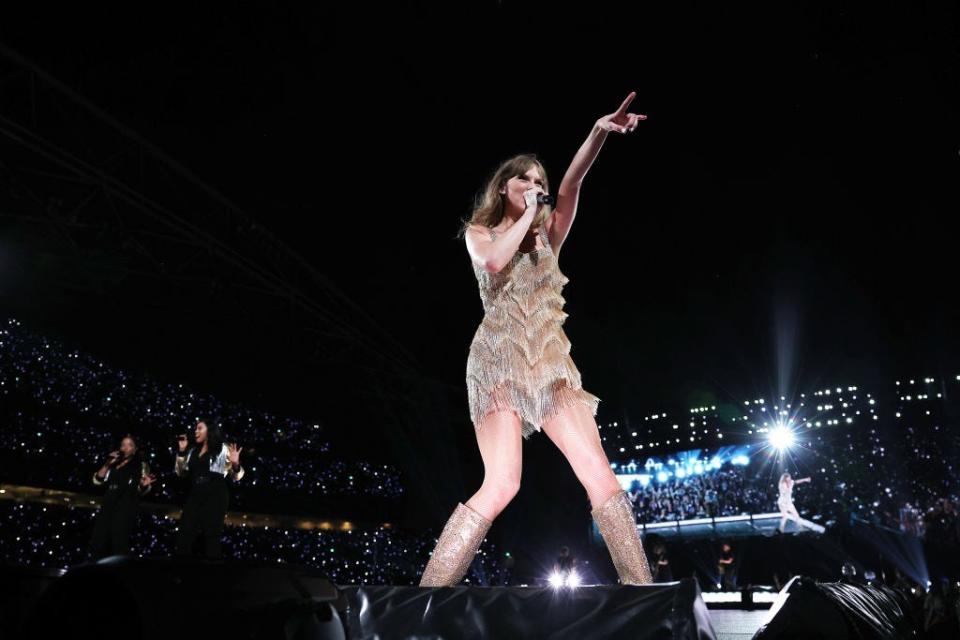Taylor Swift is making Singapore a mountain of money, and some of the country's neighbors are salty about it
Singapore is the only Southeast Asia stop of Taylor Swift's Eras Tour.
The concerts are part of a push to boost tourism in Singapore after the height of the pandemic.
But some Southeast Asian countries aren't happy about how it's all playing out.
Taylor Swift isn't just another celebrity on a world tour — she's literally boosting economies.
Her impact is so huge that Singapore shelled out nearly $3 million per show to sign an exclusive deal with her for the Southeast Asian leg of her Eras Tour, Thai Prime Minister Srettha Thavisin said at a business forum last month.
Singapore authorities said its tourism board disbursed a grant to support Swift's event but declined to comment on specifics of the deal to Business Insider, citing business confidentiality. Edwin Tong, Singapore's culture minister, told the local outlet Mothership on Wednesday that the amount of grant given "is not what is being speculated online."
"It is likely to generate significant benefits to the Singapore economy, especially to tourism activities such as hospitality, retail, travel, and dining, as has happened in other cities in which Taylor Swift has performed," Singapore's culture ministry and tourism board said in a joint statement.
Swift is scheduled to perform six shows in Singapore from March 2 to March 9. More than 300,000 tickets have been sold.
But it's not just about the money.
Cultural clout
Mega-concerts such as Swift's help build Singapore's status as a fun place to visit rather than just a place to do business and hold trade events, tourism experts say.
After all, strait-laced Singapore isn't known for being the most exciting tourist destination.
"Live music from some of the biggest names in the industry marks a slight shift in Singapore's attractiveness as a tourism destination," Yun Liu, an HSBC economist, wrote in a February note.
Tong, the Singapore culture minister, told Mothership the city-state was looking "beyond just the economic impact" of those concerts.
"We look at it from the perspective of building Singapore into a cultural hub that's of strong strategic value for us," Tong told the outlet.
"Such concerts help put us on the top of the minds of tourists and position us as a luxe destination that justifies the premium," Kevin Cheong, the managing partner of Syntegrate, a consultancy for destination and tourism development, told BI.
Tourist spend
Everywhere Swift's tour goes, a boost in tourism-related spending follows, known as "Swiftonomics." That ranges from air tickets and accommodation to food and beverage, as well as niche retail sectors such as the sale of friendship bracelets.
Singapore is no exception.
Economists estimate that Swift's concerts in Singapore could contribute up to 500 million Singapore dollars, or $372 million, in tourist receipts.
David Mann, the Asia Pacific chief economist of Mastercard, told BI that since Singapore is one of the most expensive cities in the world and has a strong currency, it was unlikely tourists from places with weaker currencies would be splurging on retail therapy in the country.
It's a different story for spending on experiences — and it's heightened because Singapore is Swift's only stop in Southeast Asia.
Mann said the people who had money to pay for flight tickets, Swift's concert tickets, and a hotel were likely to keep spending at other tourist spots.
Since the Singapore government collects a 9% tax on all goods and services, tourist spending goes to the national coffers, too.
"It goes to the entire ecosystem," Cheong said.
The Nomura economist Si Ying Toh wrote in a February note that Swift and the British band Coldplay — the first two major acts of 2024 in Singapore — were likely to contribute 0.25 percentage points to the country's first-quarter GDP.
Taylor Swift 'pays the bills' in the short term
Cheong said getting exclusive access to Swift was a smart short-term move by the Singapore government: "You need business right now to help pay the bills and put us on the world map."
The wealthy city-state's neighbors are taking notice, and not all of them are happy about it.
Singapore's move to award a grant for Swift's appearances in the city-state is done "at the expense of neighboring countries, which could not attract their own foreign concertgoers and whose fans had to go to Singapore," Joey Salceda, a Filipino lawmaker, told the Philippine Star on Thursday.
Srettha, the Thai prime minister, also threw Singapore some shade and suggested his country could have splashed some money to attract Swift's performance, too.
"If I had known this, I would have brought the shows to Thailand," Srettha was quoted as saying in the Bangkok Post, referring to Singapore's grant for Swift's concert.
The FOMO appears to extend to Indonesia, with the tourism minister, Sandiaga Salahuddin Uno, telling Bloomberg TV last month that the country needed Swiftonomics for tourism and was considering more incentives for large events such as concerts.
Still, Cheong said massive performance grants couldn't be Singapore's long-term solution to boost tourism.
"It's a wise move, but is it sustainable?" Cheong asked, saying he thought Singapore was courting mega-concerts as a short-term boost before big investments — such as an eco-resort and a new tower for the iconic Marina Bay Sands hotel — were completed.
Cheong said the longer-term, more sustainable measure was to make Singapore so enticing that tourists and artists would come for their big-ticket events even without grants.
"It has to be as attractive as Las Vegas, where performers will definitely make a stop," he added.
Swift's PR team didn't immediately respond to a request for comment from BI.
Read the original article on Business Insider



